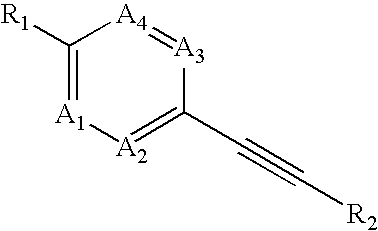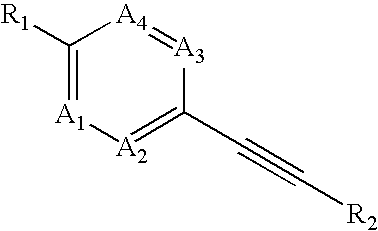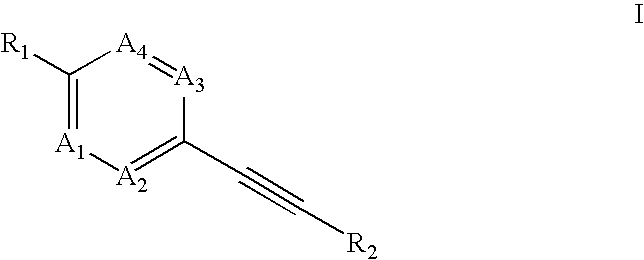Heteroaryl-substituted alkyne compounds and method of use
a technology of substituting alkyne compounds and heteroaryls, applied in the field of pharmaceutical agents, can solve the problems of endothelial death, loss of vascular structure and matrix contacts, and less favorable anti-angiogenic therapeutic approaches, and achieve the effect of inhibiting the activity of tie-2
- Summary
- Abstract
- Description
- Claims
- Application Information
AI Technical Summary
Benefits of technology
Problems solved by technology
Method used
Image
Examples
example 1
[0403]
Synthesis of 3-(2-(2-aminopyrimidin-5-yl)ethynyl)-4-methyl-N-(3-(trifluoromethyl)phenyl)benzamide
Step 1. Preparation of 3-iodo-4-methyl-N-(3-(trifluoromethyl)phenyl)benzamide
[0404]3-Iodo-4-methylbenzoic acid (2.0 g, 7.6 mmol) was taken up in SOCl2 (4 mL). The resulting slurry was allowed to reflux for 2 h upon which time the reaction was concentrated under reduced pressure to afford the corresponding acid chloride, which was used without further purification. The off white acid-chloride solid was taken up in CH2Cl2 (70 mL) followed by the addition of DIEA (1.5 mL, 8.4 mmol) and 3-(trifluoromethyl)aniline (0.86 mL, 6.9 mmol). The mixture was allowed to stir at room temperature for 3 h. The reaction mixture was diluted with CH2Cl2 (70 mL) and washed with aq. HCl (1M, 25 mL), sat. aq. NaHCO3 (25 mL), brine (25 mL), dried over anhydrous sodium sulfate, filtered and concentrated under reduced pressure to afford 3-iodo-4-methyl-N-(3-(trifluoromethyl)phenyl)benzamide as an off white ...
example 2
[0406]
Synthesis of 3-(2-(2-aminopyrimidin-5-yl)ethynyl)-4-methyl-N-(3-((4-methylpiperazin-1-yl)methyl)-5-(trifluoromethyl)phenyl)benzamide
Step 1: Preparation of 3-iodo-4-methyl-N-(3-((4-methylpiperazin-1-yl)methyl)-5-(trifluoromethyl)phenyl)benzamide
[0407]To a solution of 3-((4-methylpiperazin-1-yl)methyl)-5-(trifluoromethyl)-benzenamine (0.274 g, 1 mmol) in CH2Cl2 (3 mL) at room temperature was added 3-iodo-4-methylbenzoyl chloride (0.267 g, 0.95 mmol). The mixture was allowed to stir for 20 h. The reaction was concentrated under reduced pressure, and purified via column chromatography (0 to 20% methanol in dichloromethane) to afford 3-iodo-4-methyl-N-(3-((4-methylpiperazin-1-yl)methyl)-5-(trifluoromethyl)phenyl)benzamide. MS m / z=518. Calc'd for C24H18ClF3N4O: 517.33.
Step 2: Preparation of 3-(2-(2-aminopyrimidin-5-yl)ethynyl)-4-methyl-N-(3-((4-methylpiperazin-1-yl)methyl)-5-(trifluoromethyl)phenyl)benzamide
[0408]Aryl iodide (0.113 g, 0.22 mmol), 2-amino-5-ethynylpyrimidine (0.53 g,...
example 2a
[0409]
Synthesis of N-cyclopropyl-4-methyl-3-(2-(6-(2-morpholinoethylamino)pyridin-3-yl)ethynyl)benzamide
Step 1: 5-iodo-N-(2-morpholinoethyl)pyridin-2-amine
[0410]2-Chloro-5-iodopyridine (2.21 g, 9.25 mmol) was dissolved in 2-morpholinoethanamine (10 mL) and placed in the microwave for 30 min. at about 180° C. The reaction mixture was diluted with 100 mL EtOAc, washed with 50 mL saturated, aqueous NaHCO3, and dried over anhydrous Na2SO4. After purification by chromatography, the title compound was obtained. MS (ES+): 334 (M+H)+.
Step 2: N-(2-morpholinoethyl)-5-(2-(trimethylsilyl)ethynyl)pyridin-2-amine
[0411]5-Iodo-N-(2-morpholinoethyl)pyridin-2-amine (0.82 g, 2.46 mmol), TMS acetylene (1.70 mL, 12.3 mmol), and triethylamine (0.69 mL, 4.92 mmol) were dissolved in dioxane (20 mL) and with nitrogen for about 15 min. Tetrakis(triphenylphosphine)palladium (142 mg, 0.12 mmol) and copper (I) iodide (47 mg, 0.25 mmol) were added before the reaction mixture was heated to 80° C. for 3.5 h. The r...
PUM
 Login to View More
Login to View More Abstract
Description
Claims
Application Information
 Login to View More
Login to View More - R&D
- Intellectual Property
- Life Sciences
- Materials
- Tech Scout
- Unparalleled Data Quality
- Higher Quality Content
- 60% Fewer Hallucinations
Browse by: Latest US Patents, China's latest patents, Technical Efficacy Thesaurus, Application Domain, Technology Topic, Popular Technical Reports.
© 2025 PatSnap. All rights reserved.Legal|Privacy policy|Modern Slavery Act Transparency Statement|Sitemap|About US| Contact US: help@patsnap.com



